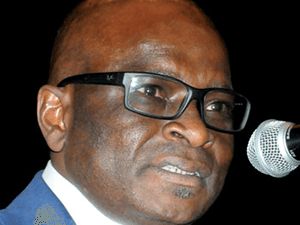
[miningmx.com] – SOUTH African mines minister, Ngoako Ramatlhodi, has made short work of January resuming his work with the same brio that established him as an industry newsmaker last year.
By way of reminder, during the first two months of his appointment in May, he took the unusual step of intervening in the platinum strike and then, only weeks later, announced he would ask that important amendments to the Mineral & Petroleum Resources Development Act (MPRDA) be referred back to Parliament because they were not investor-friendly enough.
President Jacob Zuma heeded the call and referred the amendments to the National Assembly. He then said in a letter to Parliament that the proposed amendments were unconstitutional, were potentially in breach of South Africa’s international trade agreements, and gave too much discretion to the minister.
The last point is astonishing, and worrying, because ministerial discretion was the guiding principle of the amendments.
Zuma’s letter, therefore, suggests that the amendments could be changed which will be a concern for the Chamber of Mines bearing in mind that Ramatlhodi’s reasons for returning the bill was to create separate laws for the oil and gas sector.
The chamber lauded Ramatlhodi because the hard-won compromises the chamber said it extracted in the amendments would not be tampered with, whereas Zuma’s letter would suggest the opposite.
Ramatlhodi has been somewhat more conciliatory saying it was in the interests of South African business to have the amendments cut, dried and promulgated.
“We negotiated the amendments in good faith on nine main points that concerned us,” said Mike Teke, president of the Chamber of Mines. “We are heartened by what the minister has said lately, so let’s just wait and see,” he said.
In any event, Ramatlhodi has certainly succeeded in shaking up the mining sector. But is it yet possible to form an opinion of the minister in these brief but fast-moving eight months?
There was concern in the mining sector when Ramatlhodi was first appointed because he was viewed as a nationalist who would increase state involvement in the mining sector. However, the evidence of his words suggests that is not quite the case. Not yet.
Hanre Rossouw, head of resources: frontier and emerging markets, for Investec Securities, said Ramatlhodi had brought some order to the portfolio where previously the environment tended towards confusion.
“He is definitely more process-driven and seems to have a better appreciation of the mining charter,’ said Rossouw who added that Ramatlhodi’s legal training was a factor.
Ramatlhodi’s predecessor, Susan Shabangu, who is now Minister for Women, was more of a “street-fighter,’ he said. Shabangu was also a trade unionist to whom verbal vollies were part of her modus operandi.
Whilst the referral of the amendments has received a lot of press, and will continue to be picked over in the coming weeks and months, Ramatlhodi’s recent comments about the creation of a national champion in the mining sector have received less attention.
Speaking to investors in London, Ramatlhodi said that with Anglo American and BHP Billiton having “outgrown us’ by listing overseas, it was time for another company to step up and establish the same presence in the industry, but with “a foot in the community’.
According to Ramatlhodi, this would be achieved by buying up the assets that may become available as the offshore companies restructured; he referred directly to platinum and coal assets. “We’re working on it in collaboration with the guys who are pulling out,’ he said in an article published by Bloomberg News.
What’s interesting, however, is that the picture Ramatlhodi has of a national champion may diverge from how the private sector may view such a company, especially if the first platinum restructuring he is alluding to is the likely sale of Anglo American’s 49% stake in Atlatsa Resources.
Speculation in December linked the government-owned Public Investment Corporation (PIC) with buying the 49% stake for about $385m. Although it was not confirmed, it’s possible to see how Ramatlhodi sees the South African government facilitating this redistribution of assets.
Said Des Kilalea, an analyst for RBC Capital Markets in London: “I think the national champion idea is okay provided it is on commercial terms. The idea of selling assets to the state or a national champion at some discount would rankle, I think’.
There’s precedent to a state-owned national champion in Botswana and Lesotho which have shares in private sector diamond mining, but asset deals at less than fair value would be the same as asking miners to sell products to local beneficiators at a lower price, said Kilalea. It would also discourage investment in new projects.
“It is important that the concept of “free carry’ is not abused. The BEE concept should be driven by historically disadvantaged South Africans becoming partial owners and paying from the proceeds of the investment rather than “free rides’ as this assumes that economic capital will be prepared to dilute returns,’ he said.
Another analyst who asked to be anonymous said the notion of national champion sounded as if ideology was once again attempting to drive commerce.
“Ideology is the driver of the process rather than return on capital which is entirely consistent with Government’s economic policy,’ he said.
“Unfortunately, a change in policy is only likely when the ability to finance this ideology becomes impaired,’ he said.
“The sad reality in all of this is that a continuation of “retreating foreign investors’ will see a further decline in the valuations of our mining shares, not to talk about impact on investment and labour,’ said Rossouw.
“South African investors, comprising mostly of pension funds of which the lion share is government pension funds, are already the largest investors of the sector and sadly they will see the biggest loss in value of their pension pot,’ he said.










